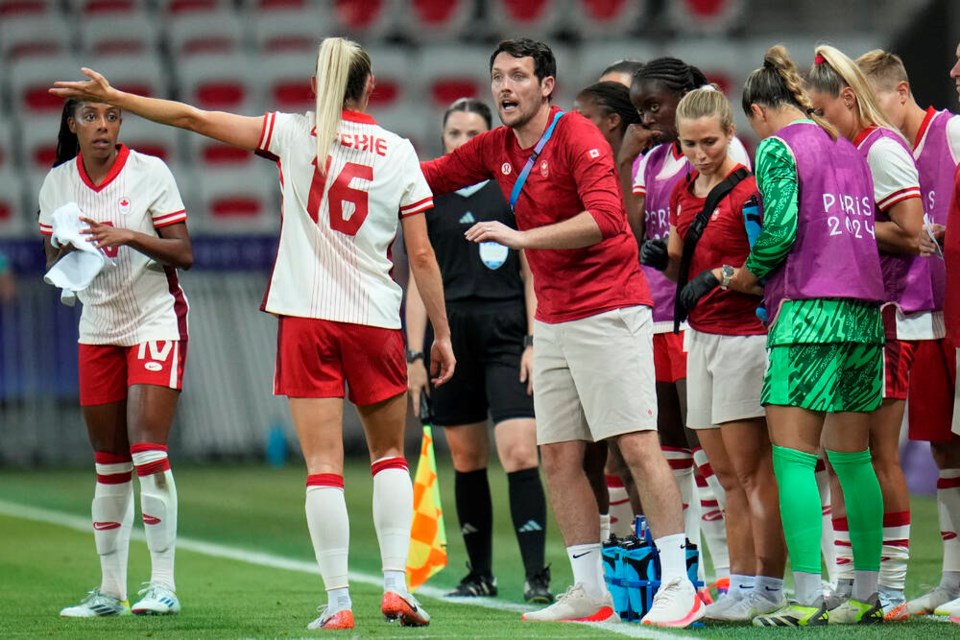PARIS — A green-clad Paris Olympic Games volunteer — among the thousands here friendly and smiling to dispel the notion of cranky and aloof Parisians — was checking media accreditations at a venue entry point when she noticed the “CAN” and commented ruefully: “Ah, la football scandale.”
You can’t escape it. It is the issue that has gobbled the 2024 Summer Olympics for Canada. There is only one Canadian story here as far as the rest of the world is concerned: It isn’t the golden swim summer of Summer McIntosh, the silver-medallist Langford-based women’s rugby sevens team, Felix Auger-Aliassime’s run to the tennis semifinals, the NBA-dominated basketball team, the Island-based women’s rowing eights’ quest to defend its gold medal from Tokyo or world-champion hammer thrower and Nanaimo-product Ethan Katzberg’s quest for Olympic gold beginning today at the Stade de France.
It’s hard to deny the issue has affected Canada’s well-worn reputation around the world as a ‘good guy’ and fair player.
“Let’s put it this way, it’s certainly not helping your [Canadian sporting] reputation in any way,” said Jack Doles, a sports broadcaster from the NBC affiliate in Grand Rapids, Michigan, here working on NBC’s U.S. national coverage of the Paris Games.
Just how much damage the drone-spying women’s soccer scandal has done to Canada’s rep for fair play, honest-brokering and all that, remains to be seen. Everybody here seems to have heard about it, largely because Canada is the Olympic gold medallist from Tokyo 2020 and looking to defend.
“It’s definitely surprising because Canada has such a good reputation in almost all things,” said Olivia Ings from London, who was cheering on the British gymnastics team at the Bercy Arena along the Seine.
“Mostly because of that, I think this scandal will pass. It’s a shame for the players, though.”
That’s the sentiment felt by many. Why should the Canadian players, who by all accounts knew nothing of the spying on opposition teams, be punished for the actions of team coaches and staff? Incredibly, Canada went 3-0 in group play and has qualified for a quarter-final game against Germany on Saturday despite being docked six points by FIFA as punishment for the drone spying on New Zealand prior to the first group game. A Canadian appeal of the six-point penalty was denied. Canada Soccer, hardly awash in cash, was also fined $312,000 by FIFA.
Focus and resilience has certainly not been in short supply among the Canadian players through this mess.
With Canadian head coach Bev Priestman, along with assistant coach Jasmine Mander and analyst Joseph Lombardi, expelled from the Olympics because of the spying (Priestman was also suspended for one year by FIFA), it has fallen to assistant Canadian coach Andy Spence to hold it all together.
“We focus on what we can control and just being focused on the next step ahead, which is now the quarter-final,” said Spence.
“I’m so pleased for the players. I can’t express how pleased I am for them. It’s really been obviously a challenge. I’m super proud of everyone.”
Canadian player Vanessa Gilles evoked a popular TV soccer show character: “Ted Lasso says to believe. And believe to the very end. That’s what we [are doing].”
But with reports the Canadian team spying has been historical, the question remains if Canadians and the world believes the Olympic gold medal in Tokyo was won fairly or if it is tarnished.
“That makes me ill and sick to my stomach, because that was one of my favourite Olympic moments in history,” said David Shoemaker, CEO of the Canadian Olympic Committee.
It would certainly be a huge reputational blow for a previously beloved national side that has been an inspiration, especially to young female soccer players across the country, and which twice sold out Starlight Stadium with adoring fans during post-Tokyo exhibition games against Nigeria and Australia.
That will be up to the Canadian public to separate the players from the path those in charge decided to take.
>>> To comment on this article, write a letter to the editor: [email protected]



